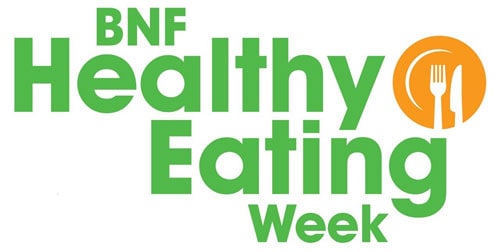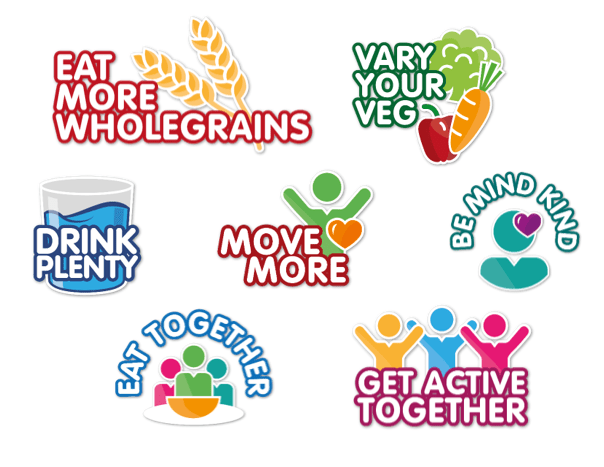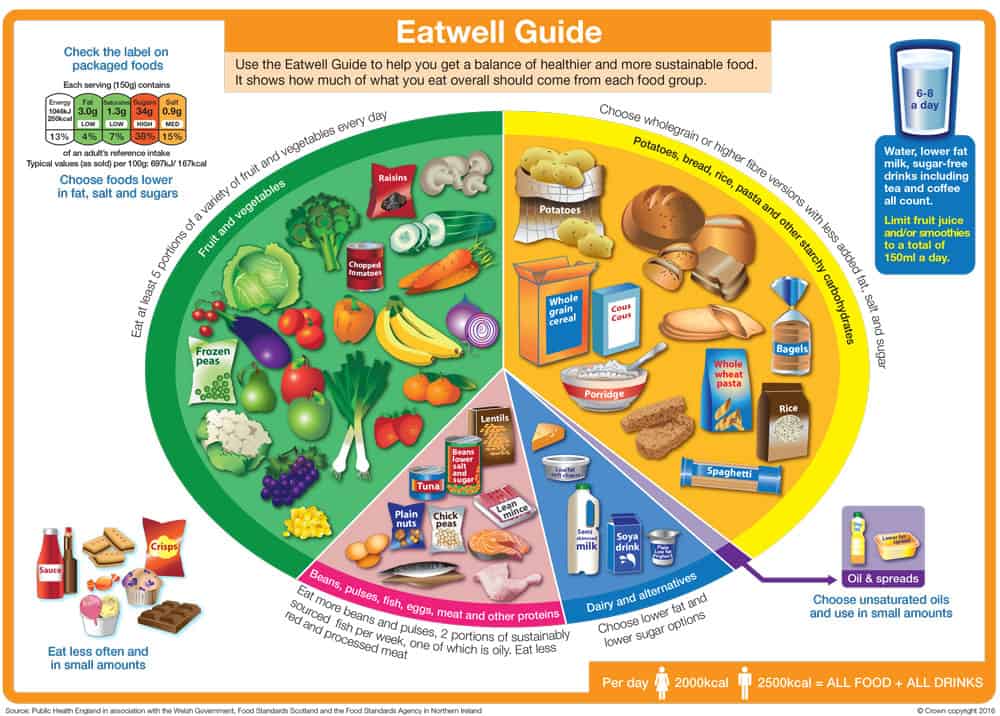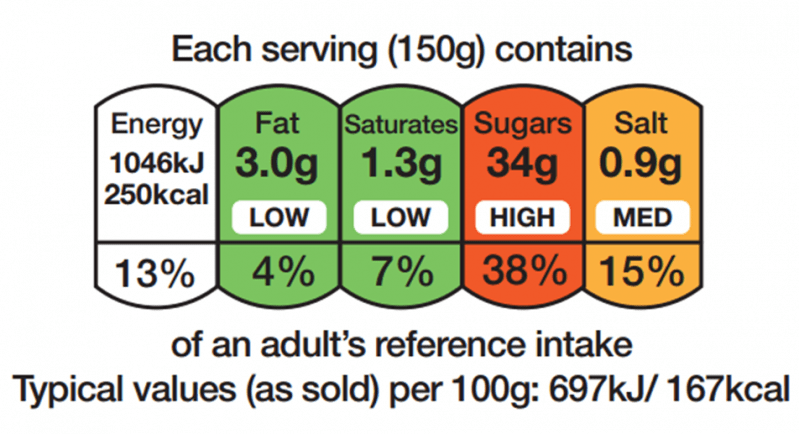Healthy Eating Week 2021

Date
Location
Search Awareness Days
What is Healthy Eating Week?
Healthy Eating Week is an annual campaign run by the British Nutrition Foundation every second week in June that aims to raise awareness amongst nurseries, schools, universities and workplaces about the benefits of healthy eating and drinking in combination with and regular exercise.
This year the event is on Monday-Friday, 14-18 June 2021.
A lot of focus is put on education, especially encouraging children to get into healthy eating habits, teaching them the importance of good nutrition, making it fun, and encouraging staff and caterers to get involved in the campaign.

Focus has been made in the past on breakfast, eating your five-a-day, hydration, activity and sleep. The 2019 campaign video can be seen below:
For 2020 the key messages are slightly different:
- Eat more wholegrains (Monday)
- Vary your veg (Tuesday)
- Drink plenty (Wednesday)
- Move more (Thursday)
- Be mind kind (Friday)
- Get active together* (Saturday)
- Eat together* (Sunday)
Downloadable marketing materials have been created including challenges and posters, marketing material information sheets, activity ideas, video clips, online events, and certificates for you to put up, dish out and follow.

What is Healthy Eating?
Healthy eating is critical to our physical and mental health and wellbeing giving your body and organs the right nutrients to work effectively. It means eating the right food and drinking the right liquids to maintain a healthy weight.
Do not forego exercise either. Regular exercise which gets the heart rate pumping is essential to healthy living, burns off excess energy, keeps muscles active and maintains a healthy mental wellbeing.
To this end experts talk of an energy balance where calories consumed need to be burnt off or used in normal bodily processes. When these aren’t used – when we consume more calories than we burn off – we start to gain weight as excess calories are stored as fat.
As a guideline it’s recommended healthy adults eat:
- Women: 2,000 calories a day
- Men: 2,500 calories a day
According to the Eatwell Guide we should:
- Eat at least five portions of a variety of fruit and vegetables every day (see 5 A Day)
- Base meals on higher fibre starchy foods like potatoes, bread, rice or pasta
- Have some dairy or dairy alternatives (such as soya drinks)
- Eat some beans, pulses, fish, eggs, meat and other protein
- Choose unsaturated oils and spreads, and eat them in small amounts
- Drink plenty of fluids (at least six to eight glasses a day)

Use the Eatwell Guide to help you get a balance of healthier and more sustainable food. It shows how much of what you eat overall should come from each food group.
In this video the British Nutrition Foundation explains the Eatwell Guide:
Split into five segments to represent the five food groups as follows:
- Potatoes, bread, rice, pasta and other starchy carbohydrate foods: 38%
- Fruit and vegetables: 40%
- Dairy and alternatives: 8%
- Beans, pulses, fish, eggs, meat and other protein: 12%
- Oils and spreads: 1%
This adds up to 99% due to rounding up.
It’s not just the consumption of good food. Government and nutritionist advice also call for eating less bad food: saturated fat, sugar and salt.
Cutting down on saturated fat can lower your blood cholesterol and reduce your risk of heart disease. Most people in the UK eat too much saturated fat. The average man should have no more than 30g saturated fat a day. The average woman should have no more than 20g saturated fat a day. Children should have less saturated fat than adults. But remember that a low-fat diet isn’t suitable for children under five.
Regularly consuming foods and drinks high in sugar increases your risk of obesity and tooth decay. Ideally, no more than 5% of the energy we consume should come from free sugars (Any sugar added to food or drink products by the manufacturer, cook or consumer including those naturally found in honey, syrups and unsweetened fruit juice). Currently, children and adults across the UK are consuming 2-3 times that amount.
The problem is many packaged foods and drinks contain surprisingly high amounts of free sugars including some breakfast cereals, yoghurts and fruit juice drinks.
Eating too much salt can raise your blood pressure, which increases your risk of developing heart disease or stroke. And since many people in the UK eat too much salt, that means that lots of people would benefit from cutting down. Adults should eat no more than 6g of salt a day. Children should have even less. 6g of salt is about a teaspoonful. But remember we’re not just talking about the salt you add to your food because most of the salt we eat is already in everyday foods such as bread, breakfast cereal, pasta sauce and soup.
Food labelling (the traffic light system) is a useful way to measure the amount of energy, fate, saturated fat, sugars and salt in our food.

What is Unhealthy Eating?
So, what is unhealthy eating? Surely it’s just the opposite of healthy eating, right?
Well, yes and no. Nutritionists rarely say don’t eat chocolate, have a beer or glass of wine or a bag of crisps though we know they contain large amounts of fats, salts, sugar and the like.
However, if all you ate was fat free chicken, lentils, whole grains, fruits and drank water not only would you be bored stiff you’d probably feel utterly miserable which would have a detrimental impact on your mental health (and you never be off the loo!).
While we all advocate eating well, what then is an unhealthy or unbalanced diet?
“An unbalanced or imbalanced diet is one that consists of either too much or too little protein, fats, carbohydrates, fibre, vitamins, minerals and fluids – the essential components of a healthy and nutritious diet,” says Success Stream.
Foods that contain high amounts of salts, sugars and fats are bad for us especially in large quantities. Typical examples are excesses of alcohol, cakes, sweets, pastries and chocolates.
The important thing is to have a balanced diet and eat ‘unhealthy’ food and drink in moderation. The odd pork pie, scotch egg, portion of fish and chips or hamburger won’t hurt you but eating them regularly and in large amounts can have a detrimental effect on your health over a prolonged period.
The BNF describes foods high in fat, salt and sugars in this video guide:
Problems Caused by Poor Diets
Problems caused by poor diets are well documented but as this is Healthy Eating Week let’s just recap on some of the most common.
Obesity
Obesity describes someone who is very overweight with a lot of body fat. The figures in the UK are frightening: around one in every four adults and around one in every five children aged 10 to 11 are obese.
Obesity is caused by poor diet, over-eating and a lack of exercise and is one of the biggest health issues facing Western society today and a growing problem (no pun intended) in developing countries as well. It is also a major cause of many other health problems.
According to NHS figures, May 2019:
- 10,660 hospital admission were directly attributable to obesity
- 711,000 hospital admissions were due to obesity being a factor
- 29% of adults are classified as being obese
- 20% of children over six are classified as obese
- 29% of adults and 18% of children had their five-a-day
How do you know if you’re obese other thank just looking at yourself in the mirror and asking yourself honestly if you’re a healthy weight?
A traditional measurement of Body Mass Index can tell you if you’re a healthy weight, or not, but isn’t always a good guide to obesity (someone may be very strong, muscular and heavy but not fat – they may be as fit as a fiddle).
A better guide is measuring your waist: men with a waist size of 94cm (37in) or more and women with a waist size of 80cm (31.5in) or more are more likely to develop obesity-related health problems.
Diabetes
Type 2 diabetes is another major health issue affecting the West and often caused by obesity.
Data released by Diabetes UK in 2020 shows there are 4.8 million people in the UK with diabetes of which 90% are Type 2, 8% are Type 1 (unfortunately that’s me), and about 2% have other forms of the disease. This is estimated to grow to 5.3 million by 2025.
People with Type 2 diabetes are 50% more likely to die prematurely than those without diabetes. A common complication of diabetes that can lead to early death is heart disease. People with Type 2 diabetes are also two to two-and-a-half times more likely to experience heart failure and twice more likely to have a heart attack compared to people without diabetes.
As if that wasn’t enough, further diabetic figures show:
- At least 10,350 people in the UK have end stage kidney failure because of their diabetes
- More than 1,700 people have their sight seriously affected by their diabetes every year in the UK
- Every week diabetes leads to more than:
- 169 amputations. Someone with diabetes is 20 times more likely to experience an amputation than someone without diabetes
- 680 strokes
- 530 heart attacks and almost 2,000 cases of heart failure
- More than half of all cases of Type 2 diabetes could be prevented or delayed
- Obesity is responsible for 80 to 85% of someone’s risk of developing Type 2 diabetes
- The NHS spends at least £10 billion a year on diabetes. That’s 10% of its entire budget
- One in six people in a hospital bed has diabetes
- In some hospitals over a quarter of beds are used by people with diabetes
- People with diabetes are twice as likely to be admitted to hospital
- Almost 80% of the money the NHS spends on diabetes is on treating complications
And the list goes on.
Coronary Heart Disease
Eating a poor diet (and doing little exercise) can also increase the risk of developing coronary heart disease by giving you high blood pressure and high cholesterol. You’re also at more risk if you have diabetes and/or are obese or overweight.
The NHS suggests several ways you can reduce your risk of developing coronary heart disease (CHD), such as lowering your blood pressure and cholesterol levels one of which is a healthy, balanced diet as described above.
Some food for thought (yes, pun intended) from the British Heart Foundation:
- Around 80 percent of people with heart and circulatory diseases have at least one other health condition
- 7.4 million people are living with heart and circulatory diseases in the UK
- CHD is responsible for around 64,000 deaths in the UK each year, an average of 180 people each day, or one death around every eight minutes
- Healthcare costs relating to heart and circulatory diseases are estimated at £9 billion each year
Breast and Bowel Cancer
Poor diet, and therefore obesity, have also been linked to breast and bowel cancer – two of the biggest killers of all cancers.
Cancer Research UK states:
- 6% of cancer cases are caused by people being overweight and obese
- Overweight and obesity is the UK’s biggest cause of cancer after smoking
- Overweight and obesity causes 13 types of cancer: oesophageal, stomach, bowel, liver, pancreas, gallbladder, breast, uterus, ovary, kidney, thyroid, myeloma, and meningioma
For breast cancer:
- 55,176 of new cases 2015-17
- 11,399 deaths from breast cancer, 2015-17
- 76% survive breast cancer for 10 years or more
- 23% of breast cancer cases are preventable
For bowel cancer:
- 42,317 new cases of bowel cancer, 2015-2017
- 16,272 deaths from bowel cancer, 2015-2017
- 53% of people survive from bowel cancer for 10 years or more
- 54% of cases are preventable
